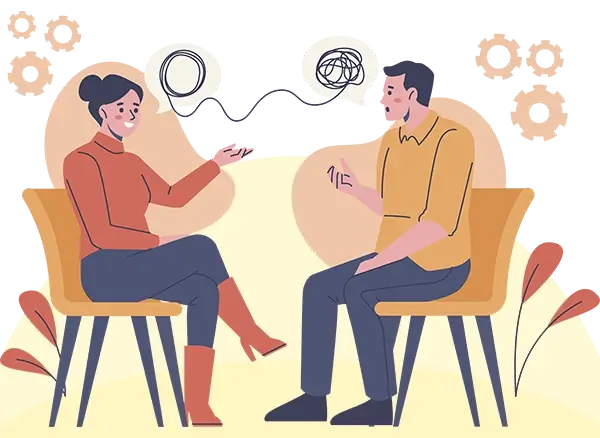Learn whether you may be living with an Eating Disorder with this expert-reviewed test. After receiving your results, you’ll have the opportunity to learn more about your symptoms and talk to a licensed therapist.
Begin TestThis mental health assessment is not a diagnosis or a substitute for licensed therapy. For more information on how to get scheduled with a qualified mental health professional, click here.
Do you feel as though you and food have a rocky, toxic relationship? You may over or under eat (sometimes both), count your calories, and obsess over food. You might have an eating disorder. This free online assessment will provide insight into whether there is a possibility that you may have symptoms of an eating disorder. This online test is not meant to act as a formal diagnosis or to replace a mental health professional. The test is meant only to be an informative tool.
Begin Test
The symptoms of an eating disorder may differ based on the unique individual and their specific form of eating disorder. Some of the possible symptoms of eating disorders include obsession with food and calories, dramatic weight loss or gain, over-exercising, purging, or eating a large quantity of food in a short period of time. These do not cover all the possible symptoms, but just some common ones.
Eating Disorders can have a variety of causes. Some of the common causes of eating disorders include trauma, anxiety, depression, and other mental health conditions. These mental health conditions can contribute to the presence and severity of eating disorder symptoms. There are also various risk factors. Ongoing cycles of dieting can be a major risk factor for eating disorders.
One of the most common forms of treatment for eating disorders is Cognitive Behavioral Therapy. In CBT, the therapist works with the individual to address any negative behavioral and thought patterns that may be contributing to the eating disorder. In some more severe cases, a therapist may recommend an inpatient treatment facility for around-the-clock care.
If you think you may have an eating disorder but don’t score highly on this test, it’s worth it to talk to a mental health professional. The symptoms of eating disorders may differ per person and the type of eating disorder. One ten-question quiz can not fully capture all the possible types of eating disorders and the symptoms associated with them. It is always best to reach out to a mental health professional for more support and information.
If you feel as though you are suffering from an eating disorder, you are not alone. Research shows that 28.8 million Americans will have an eating disorder at some point in their lives. Eating disorders are a serious mental health condition that can have a large impact on day-to-day life and social interactions. In some severe cases, they may cause severe illness or even death. If you feel as though you are suffering from an eating disorder, it is important to seek treatment or advice from a mental health professional. Reach out to Lifebulb today for more information.
Find a Therapist

Common eating disorders include:
Anorexia nervosa – This involves restricting food intake, having a strong fear of gaining weight, and experiencing a distorted body image.
Bulimia nervosa – This includes episodes of binge eating followed by purging, which can involve vomiting, excessive exercise, or using laxatives.
Binge-eating disorder – This is characterized by recurrent episodes of eating large amounts of food without purging, often along with feelings of guilt or shame.
Avoidant/Restrictive Food Intake Disorder (ARFID) – This involves avoiding certain foods due to sensory issues, fear of choking, or a lack of interest in eating.
Other specified feeding or eating disorders (OSFED) – These are disordered eating patterns that don’t fit the other categories but still cause distress.
Anorexia, Bulimia, and Binge-Eating Disorder are considered the big three types of eating disorders.
The best way to treat disordered eating is through therapy. Sometimes, medication may also be used. Treatment usually combines therapy, nutrition counseling, and medical support. Cognitive Behavioral Therapy (CBT) and other proven therapies can help address unhealthy thoughts and behaviors. Building a healthy relationship with food, learning coping strategies, and seeking professional guidance are essential steps toward recovery.
Recognizing and stopping an eating disorder early makes recovery easier. Look for these warning signs of an eating disorder:
Extreme concern about weight, body shape, or calorie intake
Skipping meals or eating very little
Binge eating or purging behaviors
Constant focus on food, dieting, or exercise
Avoiding social situations that involve food
Rapid weight changes or frequent fluctuations
Eating disorders can be deadly when left untreated. If you recognize these signs, talk to a therapist today.
If your thoughts or behaviors around food, eating, or body image cause distress, affect your daily life, or impact your physical health, you may have an eating disorder. A professional evaluation by a doctor, therapist, or dietitian is the best way to find out and receive proper treatment.